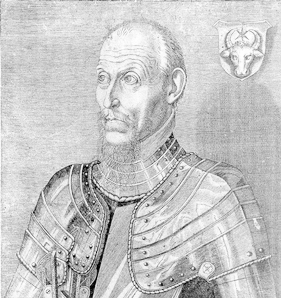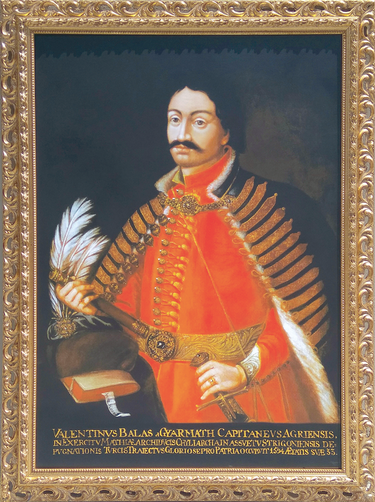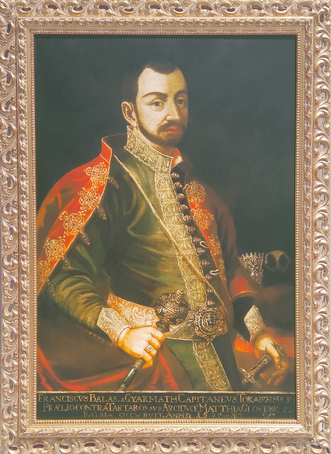JÁN BALAŠA (1518 – 1577) | ||
 | ||
Governor of Zvolen and Hont County. The younger brother of Melchior Balaša and son of František Balaša (1471 – 1526). In 1554, when the Slovak mining towns were under direct threat, King Ferdinand I. Habsburg appointed him Captain of Mining Towns, governor of Zvolen County and Captain of the Zvolen Castle. When defending the mining towns and the surrounding areas, he often engaged in conflicts with the Ottomans and faced many ill-wishers. Most well-known arehis lasting disputes with Ján Krušič, Captain of the Free Royal Town of Krupina (1553 – 1562). In early April 1562, he attacked the castle of Szécsény. His poorly equipped troops consisting of untrained soldiers from the mining towns of central Slovakia suffered a crushing defeat. After the defeat of the Hungarian troops, he was deprived of his function as Chief Captain of Mining Towns. In 1569, at the meeting of the Hungarian nobility in Bratislava, he was accused of conspiracy with the Ottomans and treason. In the spring of 1570, after a half-year of imprisonment he fled to his castles of Divín and Modrý Kameň and then, with his entire family to Poland. After many appeals to the King, in 1572, King Maximillian gave him mercy. He died in May 1577 at the property of his family in Považská Bystrica. He is buried along with his family in the Roman Catholic Church in the Liptov village of Hybe. | ||
VALENTÍN BALAŠA (1554 – 1594) | ||
 | ||
Son of Ján Balaša (1518 – 1577), Hungarian Renaissance poet who wrote in Hungarian, Ottomans and Slovak. Initially, he was influenced by Italian Humanism, but later created a unique form of Renaissance poetry. He used an advanced poetic technique. He was the founder of modern Hungarian lyric poetry and the first writer of Hungarian erotic poetry. His heroic and religious poems belong to the highlights of Renaissance lyrics. The concept of Balaša’s strophe (stanza) has been preserved to this day. It has a rhyme structure of a a b c c bd d b, or a 9-line poetry form with rhymes repeating in the third, sixth and ninth line. His most important dramatic work is Credulus and Julia or a Nice Hungarian Comedy. He was born October 20, 1554 in the Zvolen Castle. He spent his childhood in Zvolen and Liptovský Hrádok. He studied at universities in Germany (Nuremberg) and Italy. His educator was a reformed priest Peter Bornemisa. He spoke eight languages. From 1573 – 1574, he studied at a military school in Eger (Hungary). As his father brought him up in a military and patriotic spirit, he participated in many battles in the war against the Ottomans, in Transylvania he fought against the army of the Voivode of Transylvania Stephen Báthory, and ultimately lived in his captivity until 1577. After returning to Hungary, he lived in the castle of Liptovský Hrádok together with his brother František. He lived an eventful life of a warrior and poet. He expressed his patriotism in his poems. At the time of the 15-year war against the Ottomans, he fought in the ranks of the Imperial Army with the troops of Mikuláš Pálfy. He took part in the conquest of the ancestral castles of Modrý Kameň and Divín. In December 1593, the Ottomans left the Modrý Kameň castle. Valentín Balaša died on May 30, 1594 in Esztergom after being wounded in the battle for the liberation of the town from Ottoman domination. He and his brother František were buried in the Liptov village of Hybe. His only son Ján was born from a marriage (which was not recognised by the Church) with his cousin Kristína Dobó in 1585. He died in 1601 at the age of sixteen. His grave with a memorial is in Wroclaw (Poland). With the death of Ján, the male line of Ján Balaša died out. (1577). | ||
 | ||
FRANTIŠEK II. BALAŠA (1563 – 1594) | ||
 | ||
A significant fighter against the Ottomas and Captain of Tokaj, Hungary. In 1594, he was wounded at the Battle of Hatvan. At that time, he was the commander of his fifty riders, whom he led with an unhealed wound to the Battle of Monostorpályi, where he was fatally wounded. He died in July 1594, less than two months after his brother Valentín. He was buried next to his brother in the church in Hybe. | ||
Go to content
Back to content


